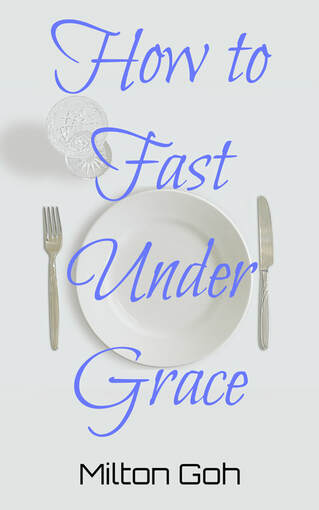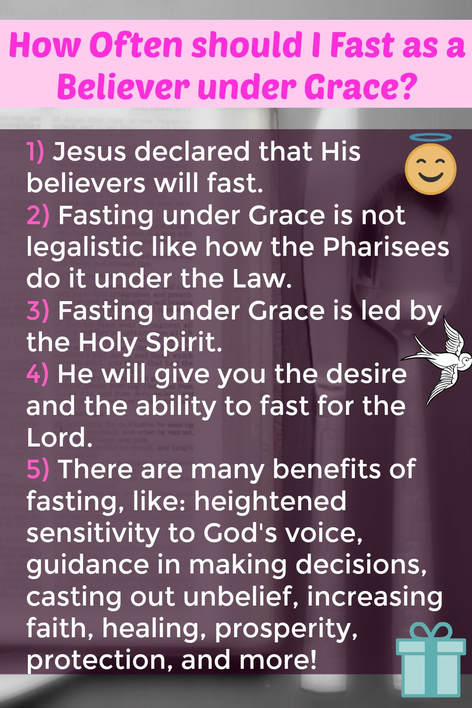How Often should I Fast as a Believer under Grace (As well as the Rich Benefits of Doing so) - A Daily DevotionalThis is an original daily devotional. You can read more devotionals, eBooks and sermon notes when you become our patron on Patreon here. You will also receive my ebook "How to Fast Under Grace" as a limited-time offer if you join us by the end of January 2019. Nowadays fasting is even being embraced by the secular world in the name of health. Terms like “intermittent fasting” are coined but these fasts are not done with God in mind. In the Gospels of Matthew, Luke and Mark it records Jesus alluding to the fact that His believers will fast after His ascension to heaven: “Then the disciples of John [the Baptist] came to Jesus, asking, “Why do we and the Pharisees often fast [as a religious exercise], but Your disciples do not fast?” And Jesus replied to them, “Can the guests of the bridegroom mourn while the bridegroom is with them? The days will come when the bridegroom is taken away from them, and then they will fast. But no one puts a piece of unshrunk (new) cloth on an old garment; for the patch pulls away from the garment, and a worse tear results. Nor is new wine put into old wineskins [that have lost their elasticity]; otherwise the wineskins burst, and the [fermenting] wine spills and the wineskins are ruined. But new wine is put into fresh wineskins, so both are preserved.”” (MATTHEW 9:14-17 AMP) “But the days will come when the bridegroom will be taken away from them, and then they will fast in those days.” (Mark 2:20 NKJV) “But the days will come when the bridegroom will be taken away from them; then they will fast in those days.”” (Luke 5:35 NKJV) In Jesus’ allegory, the bridegroom represents Himself and the guests of the bridegroom represent Christians. After which, He uses the examples of old versus new wineskins, and old versus new wine. Jesus is saying that the reasons for fasting under the New Covenant of Grace are different from the reasons for fasting under the Law, and that we cannot approach the things of Grace with an Old Covenant, Law-based mindset. Attempting to fast legalistically will lead to fruitlessness - it’ll just be voluntary starvation. There is no legalistic, fixed routine to follow when fasting Take a look at this example that Jesus gave: “He also told this parable to some people who trusted in themselves and were confident that they were righteous [posing outwardly as upright and in right standing with God], and who viewed others with contempt: “Two men went up into the temple [enclosure] to pray, one a Pharisee and the other a tax collector. The Pharisee stood [ostentatiously] and began praying to himself [in a self-righteous way, saying]: ‘God, I thank You that I am not like the rest of men--swindlers, unjust (dishonest), adulterers--or even like this tax collector. ~‘I fast twice a week; I pay tithes of all that I get.’” (LUKE 18:9-12 AMP) In the passage above, the Pharisee practices a legalistic way of fasting: he does it twice a week, but the motivation is to have an outward appearance of holiness. That’s not how God wants us to fast under Grace. Under Grace, the general rule of thumb is that we follow the leading of the Holy Spirit: “For all who are allowing themselves to be led by the Spirit of God are sons of God.” (ROMANS 8:14 AMP) “But if you are guided and led by the Spirit, you are not subject to the Law.” (GALATIANS 5:18 AMP)
|
Love this Blog?Milton Goh's Blog Archives
June 2023
AuthorHi I’m Milton Goh, I'm 30 years old and i'm a blogger who writes about Christianity, Parenting, Life Lessons that I learn from Movies/Shows, and Lifestyle. |




 RSS Feed
RSS Feed
